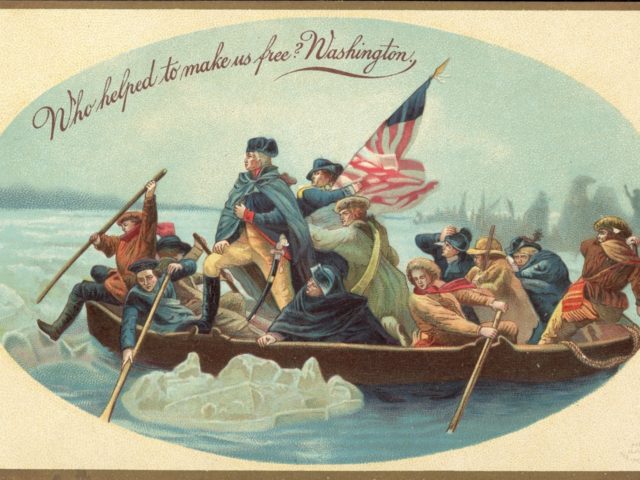‘Land of Hope’: An American History Textbook
Post# of 65629

That Offers a Balanced View of Our Country’s Story
< >

Amidst the bleak news from a poll that found only 24 percent of 18 to 29-year olds are “extremely proud to be an American” comes a literary ray of hope from the heartland.
The good news appears in the form of a new textbook, Land of Hope: An Invitation to the Great American Story, written by University of Oklahoma professor Wilfred McClay.
“We have a glut of text and trade books on American history. But what we don’t have is a compact, inexpensive, authoritative and compulsively readable book that will offer to American readers a clear, informative, and inspiring narrative of their own country,” the book jacket explains:
Such an account can shape and deepen their sense of the land they inhabit and, by making them understand that land’s rots, and share in its memories, will equip them for the privileges and responsibilities of citizenship in American society.
“The existing texts,” the jacket notes continue, “simply fail to tell that story with energy and conviction.”
They are more likely to reflect the skeptical or partial outlook of specialized professional academic historians, an outlook that leads to a fragmented and fractured view of modern American society and fails to convey to American readers the greater arc of their own history. Or they disproportionately reflect the outlook of radical critics of American society, whose one-sided accounts lack the balance of a larger perspective and have had an enormous, and largely negative, effect upon the teaching of American history in American high schools and colleges.
“This state of affairs,” the notes conclude, “cannot continue for long without producing serious consequences.”
The results of the recent poll demonstrate clearly those serious consequences for our country have already arrived.
The Gallup Poll released on July 2 found that “U.S. adults’ extreme pride in being American has been steadily weakening in recent years, and the current reading, from a June 3-16 Gallup poll, marks the lowest point to date. However, the latest two-percentage-point decline from last year’s 47% is not a statistically significant change.”
The dramatically different responses by age group to this simple question illustrate the warnings for our nation’s future: How proud are you to be an American: extremely proud, very proud, moderately proud, or not at all proud?
While 45 percent of American adults are extremely proud to be an American, only 24 percent of adults age 18 to 29 are extremely proud:
Extremely proud to be an American, by age:
45 percent–All US adults
24 percent — 18 to 29
38 percent — 30 to 49
57 percent — 50 to 64
63 percent — 65 and older
Pride in America is clearly a partisan issue, the poll demonstrates. While 76 percent of Republicans are extremely proud to be American, only 22 percent of Democrats are extremely proud to be citizens of the greatest country on earth. Among independents, 41 percent are extremely proud.
Not surprisingly, the progressive liberal ideology of those who control K-12 public education in America–their lack of pride in our country–has shaped the political philosophy of those who are age 18 to 29, and continues to shape the world view of the 50 million plus children aged 5 to 18 who attend public schools in the country.
But the damage, though severe, is not irreversible. The challenge, however, is how to get the balanced view of America presented by McClay into the hands of America’s secondary school students.
Consider, for instance, how McClay treats the issue of slavery and the founding of the republic:
The ambivalences regarding slavery that had been built into the Constitution were almost certainly unavoidable in the short term in order to achieve an effective political union in the nation. What we need to understand is how the original compromise no longer became acceptable to increasing numbers of Americans, especially in one part of the Union, and why slavery, a ubiquitous institution in human history, came to be seen not merely as an unfortunate evil but as a sinful impediment to human progress, a stain upon the whole nation. We live today on the other side of a great transformation in moral sensibility, a transformation that was taking place, but was not yet completed, in the very years the United States was being formed.
Hence, it would be profoundly wrong to contend, as some do, that the United States was “founded on” slavery. No, it was founded on other principles entirely, on principles of liberty and self-rule that had been discovered and defined and refined and enshrined through the tempering effects of several turbulent centuries of European and British and American history. Those foundational principles would win out in the end, though not without much struggle and striving, and eventual bloodshed. The United States enjoyed a miraculous birth, but it was not the product of an unstained conception and an untroubled delivery. Few things are.
Predictably, the K-12 public education bureaucracy and “industrial complex”–the giant publishers like Pearson and McGraw Hill–are not clamoring for McClay’s book. In fact, it was left to Encounter Books to publish Land of Hope.
While turning the tide in the generational decline in a true understanding of the American story is a long and torturous project, filled with opposition at every step, it can begin in every community by seeing that the message from Land of Hope is delivered to the generation of young Americans who have not yet reached the age of 18.
 (0)
(0) (0)
(0)